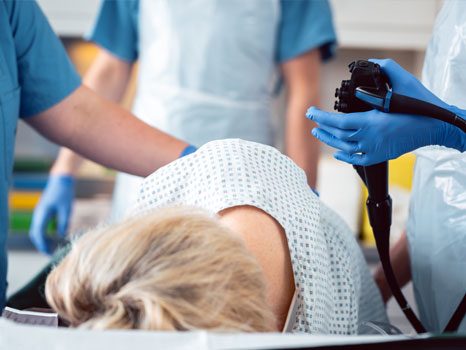Colonoscopy
A colonoscopy is a medical procedure that allows a doctor to examine the inside of a person’s large intestine (colon) and rectum using a long, flexible tube called a colonoscope. The colonoscope has a camera and a light at the end, which allows the doctor to view the inside of the colon and rectum on a monitor.
Indications for a colonoscopy may include:
- Screening for colorectal cancer
- Investigating unexplained rectal bleeding or changes in bowel habits
- Evaluating symptoms such as abdominal pain or cramping, chronic diarrhoea, or constipation
- Identifying and removing precancerous polyps
- Monitoring inflammatory bowel disease (IBD) such as Crohn’s disease or ulcerative colitis
- Follow-up after previous treatment for colorectal conditions
Some common procedures that can be done during a colonoscopy:
- Biopsy: If the doctor finds any suspicious areas or abnormalities during the visual examination, a tissue sample (biopsy) will be taken for further testing and analysis.
- Polyp removal: If your doctor finds any precancerous polyps, they will be removed during the colonoscopy. This is typically done by snaring the polyp with a wire loop.
- Haemostasis: If bleeding is detected during the colonoscopy, it can be stopped by using electrocautery, clipping, or injecting medications.
- Stent placement: In some cases, a stent (a small tube) may be inserted into the colon to relieve a blockage or stricture.
A colonoscopy is generally a safe procedure, but like any medical procedure, it does carry some risks. The risk of complications from a colonoscopy is generally low, and most people experience only mild discomfort or none at all. However, it is important to discuss the risks and benefits of the procedure with your doctor before undergoing it.
Preparation:
To enable a successful evaluation of the colon, you need to follow the following steps.
- Diet: you are advised to take low-fiber diet for 3 days up to the procedure.
- Bowel-cleansing regime: you will be prescribed a bowel-cleansing regimen, which may include laxatives, enemas, or a combination of both.
- Medications: Your doctor will give you specific instructions on how to adjust your medications before the procedure. You may be asked to stop taking certain medications, such as blood-thinning medications or aspirin, for a period of time before the procedure.
- Fasting: You will typically be instructed to fast for at least 6 hours. This is to ensure that your stomach is empty and reduce the risk of vomiting during the sedation.
- Anaesthesia or sedation: Your doctor will typically administer a mild sedative or anaesthesia to help you relax and reduce any discomfort during the procedure. You will need to arrange for someone to drive you home after the procedure.
Procedure:
On the day of the scope, anaesthetic will be administered. Once you are sedated, the colonoscope will be inserted via the anus up into the colon till the caecum and the last part of the small intestine, known as the terminal ileum. Your doctor will carefully examine the lumen to look for any abnormalities or signs of disease, such as polyps, inflammation or tumours. If any precancerous polyps are found, they will be removed during the colonoscopy; on the other hand, if a suspicious area for cancer is seen, biopsies will be taken from it for further investigation. Sometimes, bleeding haemorrhoids can also be controlled by ligation at the end of the procedure.
Post score aftercare:
You will be awake from your sedation at the end of the scope, and you will be allowed to have your meal when you are awake. However, the full sedative effect will take some time to wear off; you are advised not to drive or operate heavy machinery during this time. Your doctor will explain the scope findings to you before you are discharged; medication and a follow-up appointment will be given to you to follow up on the biopsy result, and to review your symptom after the treatment.
It is common that you may continue to experience some abdominal bloating when you are discharged; this is due to the air pumped in during the scope for proper examination. The abdominal bloating will eventually resolve within a day. However, if your symptoms persist for a long period of time or you experience massive bleeding, please contact your doctor.







